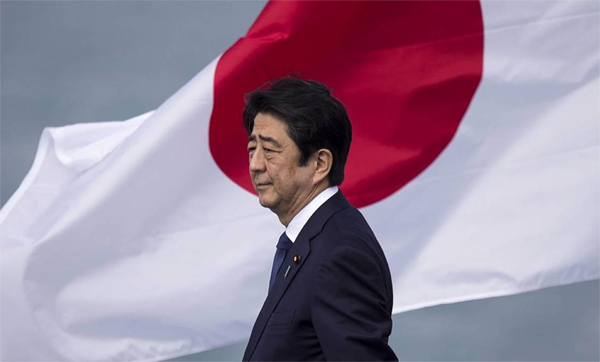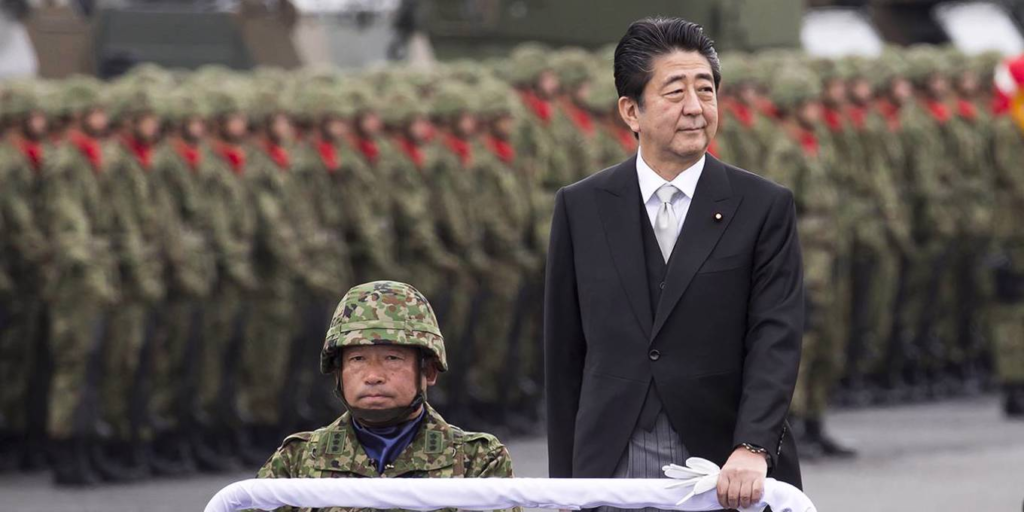
Japan’s Fallen Giant
July, 8 2022
The assassination of Abe Shinzō has deprived Japan of its greatest postwar leader, and Asia of a visionary who was leading the construction of a viable framework for regional peace.
But no bullet can diminish Abe’s impact on his country and the world, as his recent call for greater US clarity on Taiwan, his other commentaries for Project Syndicate, and Minxin Pei’s and Bill Emmott’s discussions of his seminal influence on Asia show.
US Strategic Ambiguity Over Taiwan Must End
April 12, 2022
By Abe Shinzō
For 40 years, the United States has made a point of not saying whether it would defend Taiwan against a Chinese invasion, an approach that proved effective in deterring rash action by China and by pro-independence Taiwanese. But now that circumstances have changed, so, too, must America’s strategy.
TOKYO – Russia’s invasion of Ukraine has reminded many people of the fraught relationship between China and Taiwan. But while there are three similarities between the situation in Ukraine and Taiwan, there are also significant differences.
The first similarity is that there is a very large military power gap between Taiwan and China, just as there was between Ukraine and Russia. Moreover, that gap is growing larger every year.
Second, neither Ukraine nor Taiwan has formal military allies. Both countries are forced to confront threats or attacks alone.
Third, because both Russia and China are permanent, veto-wielding members of the United Nations Security Council, the UN’s mediation function cannot be relied upon for conflicts in which they are involved. This has been the case with the current Russian attack on Ukraine, and it would also be the case in any crisis over Taiwan.
But the situation surrounding Taiwan is even more uneasy. While Taiwan has no allies, it does have the Taiwan Relations Act, a 1979 US law requiring the United States to provide Taiwan with the military equipment and supplies “necessary to enable Taiwan to maintain a sufficient self-defense capacity.” This law has functioned as a form of compensation for America’s unwillingness to say explicitly that it will “defend Taiwan” should it be attacked. This arrangement should now change.
In response to Russia’s aggression against Ukraine, the US stated early on that it would not deploy its troops in Ukraine’s defense. But when it comes to Taiwan, the US has adopted a policy of strategic ambiguity. This is the second point of difference: it remains unclear whether the US would intervene by force in a crisis involving Taiwan.
Because the US prefers to leave undefined its position on how it would respond to an assault on Taiwan, China has (at least up to now) been discouraged from military adventurism. This is so because China’s rulers must account for the possibility that the US would indeed intervene militarily. At the same time, US ambiguity has forced Taiwan to consider the possibility that the US will not intervene militarily, and this has deterred radical pro-independence groups on the island.
The US has maintained its Janus-faced policy for decades. But the third, most important difference between Ukraine and Taiwan suggests strongly that it is time for the US to reconsider its approach. Simply put, whereas Ukraine is an independent state beyond any doubt, Taiwan is not.1
Russia’s invasion is not only an armed violation of Ukraine’s territorial sovereignty, but also an attempt to overthrow the government of a sovereign state with missiles and shells. On this point, there is no controversy in the international community over the interpretation of international law and the UN Charter. While the extent to which countries participate in sanctions against Russia has differed, no country has claimed that Russia is not in serious violation of international law.
By contrast, China claims that Taiwan is “part of its own country,” and the US and Japanese position is to respect this claim. Neither Japan nor the US has official diplomatic relations with Taiwan, and most countries around the world do not recognize Taiwan as a sovereign state. Unlike in Ukraine, Chinese leaders could claim that any invasion of Taiwan that China launches is necessary to suppress anti-government activities in one of its own regions, and that such acts therefore would not violate international law.
When Russia annexed Crimea, the international community ultimately acquiesced, even though Russia had violated Ukrainian sovereignty. Given this precedent, it is not surprising that Chinese leaders may very well expect the world to be more tolerant should they, too, adopt the logic of “regional” – rather than national – subjugation.
This logic has made strategic ambiguity untenable. The policy of ambiguity worked extremely well as long as the US was strong enough to maintain it, and as long as China was far inferior to the US in military power. But those days are over. The US policy of ambiguity toward Taiwan is now fostering instability in the Indo-Pacific region, by encouraging China to underestimate US resolve, while making the government in Taipei unnecessarily anxious.
Given the change in circumstances since the policy of strategic ambiguity was adopted, the US should issue a statement that is not open to misinterpretation or multiple interpretations. The time has come for the US to make clear that it will defend Taiwan against any attempted Chinese invasion.
Whenever I met President Xi Jinping during my time as prime minister, I always made it a rule to convey clearly to him that he should not misjudge Japan’s intention to defend the Senkaku Islands, and that Japan’s intentions were unwavering. The human tragedy that has befallen Ukraine has taught us a bitter lesson. There must no longer be any room for doubt in our resolve concerning Taiwan, and in our determination to defend freedom, democracy, human rights, and the rule of law.

How Abe Changed Japan Japan’s Fallen Giant
Jul 8, 2022
By Bill Emmott
Former Prime Minister Abe Shinzō’s assassination understandably comes as a shock, given that Japan has not experienced political violence for a half-century. Perhaps not coincidentally, the last top politician to fall victim to a violent attack also had taken steps to strengthen the country’s military posture.
LONDON – Former Japanese Prime Minister Abe Shinzō’s assassination at an election campaign event in Nara, Japan, is both shocking and puzzling. It is shocking because Japan has known almost no political violence for at least a half-century, and because gun ownership in the country is tightly controlled. It is puzzling because Abe, having stepped down as prime minister in 2020, had no formal government role; yet the killing was plainly a political act.
Abe’s death is unlikely to have any impact on the July 10 elections for Japan’s House of Councillors (the upper and therefore junior legislative chamber), which the ruling Liberal Democratic Party was already expected to win comfortably. The tragic loss of the LDP’s former leader and prime minister may add some sympathy votes by increasing turnout, but it has primarily astonished and bewildered a country that is completely unaccustomed to such violence.
Abe’s legacy from his record-setting tenure as prime minister – which was divided between an unsuccessful year in 2006-07, followed by a triumphal return for seven years from 2012 to 2020 – is more notable for its effects on Japanese foreign and security policy than on domestic affairs. To be sure, Abe was a good salesman for his economic-policy agenda, which he successfully promoted under the banner of “Abenomics”; but, in the end, it was his foreign policy, not his economic program, that was transformative.
Abe brought clarity, strength of purpose, and – by dint of his longevity in office – credibility to Japanese foreign policy. The fact that the term “Indo-Pacific” is now commonly used to describe security and diplomatic strategy in Asia is largely owing to Abe, who took a pre-existing Japanese effort to build a stronger relationship with India and used it to reframe and extend his country’s position both regionally and globally.
That stance was dictated by China’s rise and its increasingly assertive rhetoric and actions in and around the South and East China Seas. Under Abe, Japan committed itself to defining a strategic and diplomatic arena that would be harder for China to dominate. Deepening ties with India was part of that strategy, as were Abe’s efforts to strengthen Japan’s military. He was a leading proponent of proposals to amend the country’s constitution so that its military could play a bigger role alongside that of its key ally, the United States.
Abe was undeniably a nationalist. He originally courted controversy with somewhat revisionist views about Japan’s wartime history, especially regarding the hot-button issue of “comfort women” whom the Imperial Japanese Army forced into sexual slavery in occupied countries. Once in office, however, he largely played down his earlier views. Moreover, he built closer and deeper diplomatic relationships across Southeast Asia, improving ties even with the country’s prickliest neighbor and former colony, South Korea. While relations with China were often tense – especially when Abe visited Japan’s controversial Yasukuni Shrine for its war dead – Sino-Japanese dialogue was nevertheless maintained.
It is always difficult to guess the motives of a lone assassin. The man arrested for Abe’s murder, 41-year-old Tetsuya Yamagami, appears to have used a large, homemade shotgun. Given that Japan is one of the world’s safest countries, security at political events tends to be light, even for a former prime minister, which presumably explains how the gunman was able to pull it off.
According to news reports, Yamagami served for three years in Japan’s navy, the Maritime Self-Defense Force, until 2005. That background – combined with Abe’s advocacy of a stronger Japanese military and efforts to eliminate the constitution’s pacifist clause (Article 9) – makes it reasonable to speculate that the killing was committed in protest against the country’s military posture.
Although Abe was no longer in office, he was undoubtedly still the country’s most prominent and well-known advocate of a stronger military capability. In that capacity, he often expressed a determination to complete the work started by his grandfather, Nobosuke Kishi, who, as prime minister in 1960, shepherded through a revision to the country’s security treaty with the US, with a view to reinforcing Japanese defense.
Sadly, it is perhaps not coincidental that the last Japanese prime minister to fall victim to a violent attack was Kishi, who was stabbed by an assailant six times shortly after the revised security treaty was approved. Unlike Abe, however, his grandfather survived.

Shinzo Abe’s Asia-Pacific
Dec 4, 2021
By Minxin Pei
Former Japanese Prime Minister Shinzo Abe knew that engagement with China was vital to ease tensions and mitigate risks. But he also knew that to ensure peace and prosperity in the region, engagement had to be complemented by solid economic and security alliances with other major powers, especially the US and India.
CLAREMONT, CALIFORNIA – It has been over a year since Shinzo Abe, Japan’s longest-serving prime minister, resigned due to illness. His successor, Yoshihide Suga, has come and gone. But institutional innovations that Abe spearheaded – namely, the Comprehensive and Progressive Agreement for Trans-Pacific Partnership (CPTPP) and the Quadrilateral Security Dialogue, or Quad – look likely to shape Asia’s geopolitical landscape for a long time to come.
Abe worked tirelessly to deliver the CPTPP, after Donald Trump effectively torpedoed its predecessor pact, the Trans-Pacific Partnership, by withdrawing the United States. The agreement that Abe revived currently includes 11 Asia-Pacific countries, with combined economic output of nearly $14 trillion.
Moreover, the CPTPP’s ranks are set to grow. The United Kingdom formally applied to join the pact last February. In September, China did the same, in an apparent effort to highlight its commitment to free trade – and set itself further apart from the US. Taiwan applied six days later.
If the UK joins the CPTPP, as now seems likely, it will add $2.7 trillion – or about 20% – to the bloc’s total economic output. Dealing with the Chinese and Taiwanese applications will be trickier. Taiwan is technically better qualified to join than China is, but the decision to admit Taiwan and reject China could stoke tensions and even spur conflict – a prospect that CPTPP signatories would prefer to avoid.
But, from a strategic perspective, it is with regard to the US that the CPTPP will make the biggest difference. While Trump is out of the White House, the US has not shaken Trump’s protectionism, and President Joe Biden has not mustered the political courage to join the pact. Yet the CPTPP is integral to the success of US efforts to counter China’s economic influence in Asia. Eventually, Biden should acknowledge this. When he does, he will have Abe to thank for the fact that there is a free-trade agreement in place that the US can join.
Abe’s legacy has been even more consequential and far-sighted in the security arena. He proposed the Quad as a regional security forum – comprising Australia, India, Japan, and the US – back in 2007, during his brief first stint as Japan’s prime minister. Although the Quad was largely inactive for the next decade, the parties agreed to reinvigorate it in 2017, owing largely to Abe’s prodding and China’s growing assertiveness.
The Biden administration now regards the Quad as a critical component of its strategy to keep China in check. In September, the group’s leaders met for an in-person summit at the White House – a gathering future historians will likely point to as a pivotal moment in the Sino-American strategic rivalry.
But the Quad is about far more than diplomatic symbolism. It is also strengthening its joint military capabilities. Last year, it held its first joint naval exercise, Malabar 2020, off the southeast coast of India. It followed up in August with Malabar 2021, held off the coast of Guam.
Given his leadership in forging the CPTPP and the Quad, one might assume that Abe was an unapologetic China hawk, bent on containment. But that assessment overlooks the third pillar of Abe’s geopolitical strategy: direct engagement with China.
In fact, even as he actively promoted the CPTPP and the Quad, Abe took care to ensure that Japan’s relations with China remained stable and cooperative. He visited Beijing in October 2018, and invited Chinese President Xi Jinping to visit Japan in April 2020, though that plan was derailed by the COVID-19 pandemic.
Ultimately, Abe was a supreme realist when it came to China. He knew that bilateral engagement was vital to ease tensions and mitigate risks. But to ensure peace and prosperity in Japan, such engagement had to be complemented by solid economic and security alliances with other major powers, especially the US and India. Only then would China take Japan seriously, treating it as an equal partner in East Asia.
Today, the third pillar of Abe’s China strategy appears to have collapsed. The Biden administration convinced Suga to ramp up Japan’s security commitments in ways that China’s rulers view as hostile. The Sino-Japanese relationship soon reached a new low.
Fortunately, Suga’s successor, Prime Minister Fumio Kishida, might have more room to maneuver. Thanks to Abe’s strategic foresight, Japan is now in a stronger geopolitical position than China. Indeed, China needs Japan more than Japan needs China, because China must maintain a workable relationship with Japan if it wants to frustrate America’s strategy of economic decoupling and security containment. So, if tensions begin to subside, China may well be the one to reach out to Japan in an effort to restore relations. Such an initiative would leave all of Asia better off.
________________________________________________________________________
Shinzo Abe was a Japanese politician who served as Prime Minister of Japan and President of the Liberal Democratic Party from 2006 to 2007 and from 2012 to 2020. He was the longest-serving prime minister in Japanese history. Bill Emmott, a former editor-in-chief of The Economist, is Co-Director of the Global Commission for Post-Pandemic Policy. Minxin Pei, Professor of Government at Claremont McKenna College, is a non-resident senior fellow at the German Marshall Fund of the United States. Energiesnet.com does not necessarily share these views.
Editor’s Note: This article was originally published by Project Syndicate, on July 08, 2022. All comments posted and published on EnergiesNet.com, do not reflect either for or against the opinion expressed in the comment as an endorsement of EnergiesNet.com or Petroleumworld.
Use Notice: This site contains copyrighted material the use of which has not always been specifically authorized by the copyright owner. We are making such material available in our efforts to advance understanding of issues of environmental and humanitarian significance. We believe this constitutes a ‘fair use’ of any such copyrighted material as provided for in section 107 of the US Copyright Law. In accordance with Title 17 U.S.C. Section 107. For more information go to: http://www.law.cornell.edu/uscode/17/107.shtml.
energiesnet.com 07 11 2022












